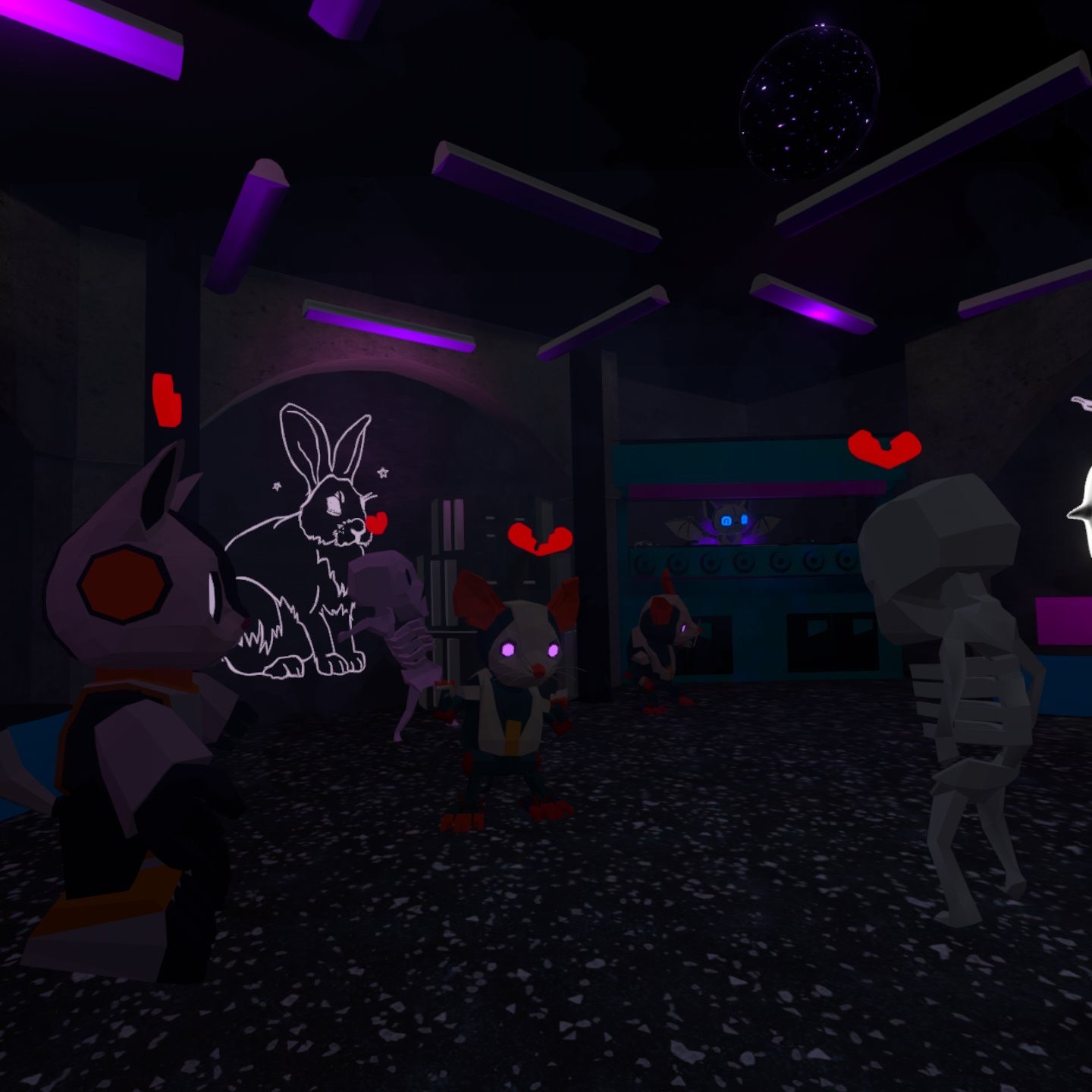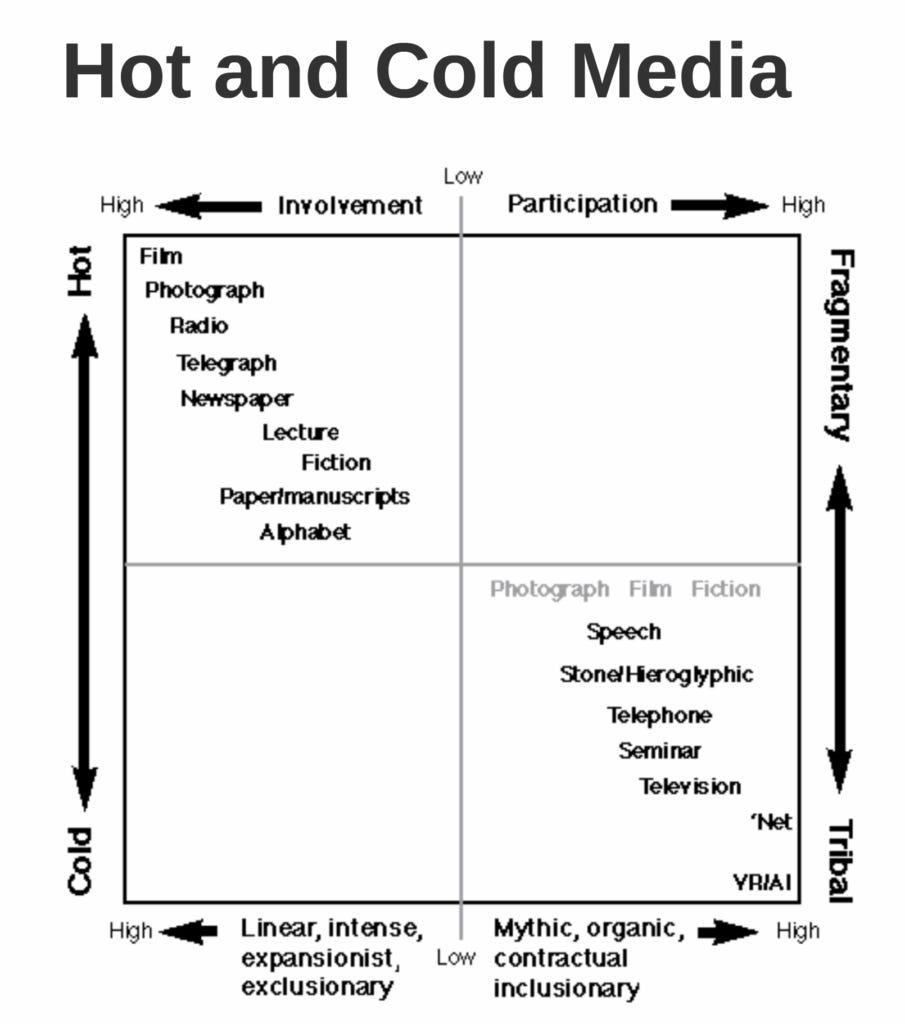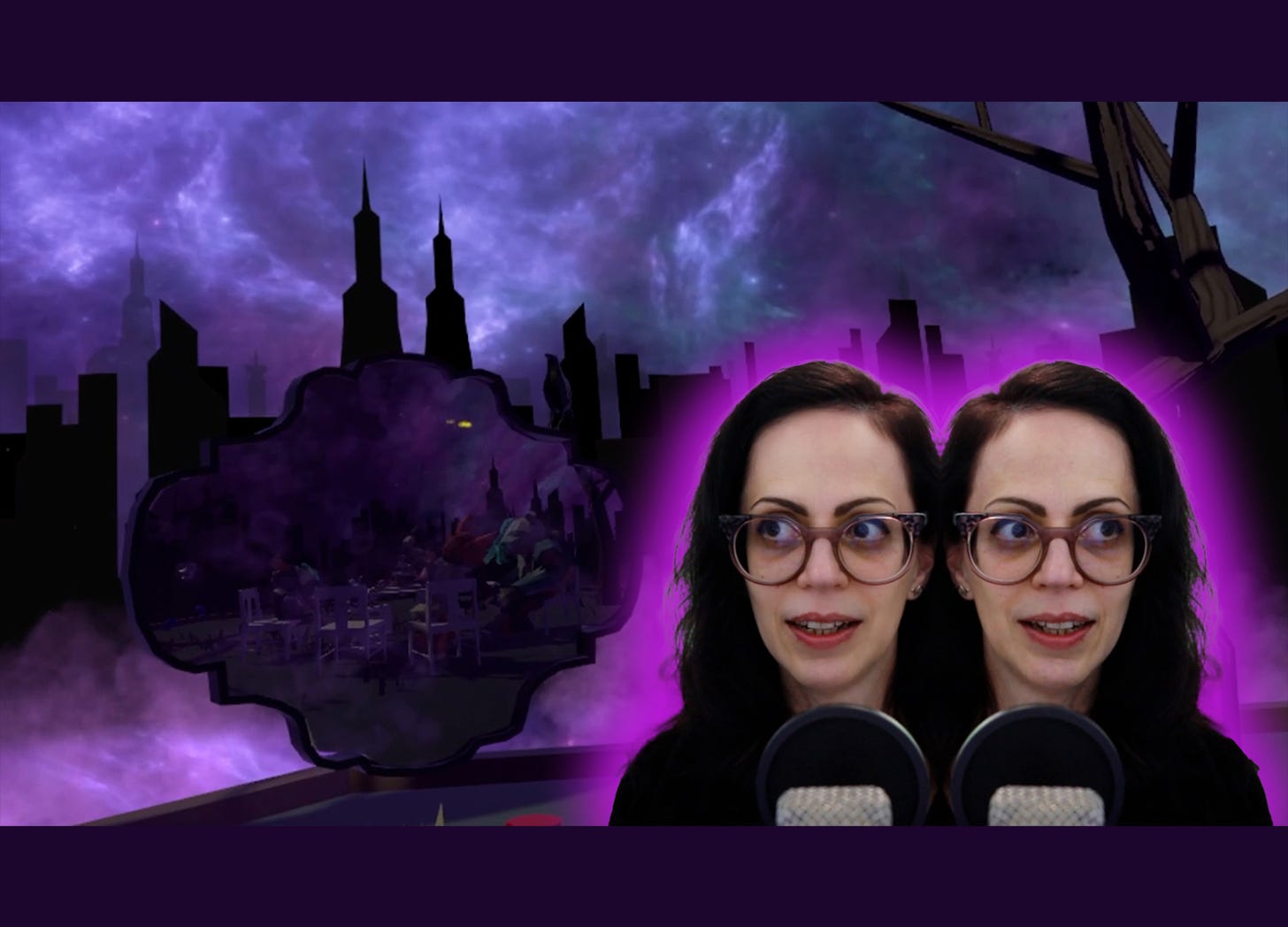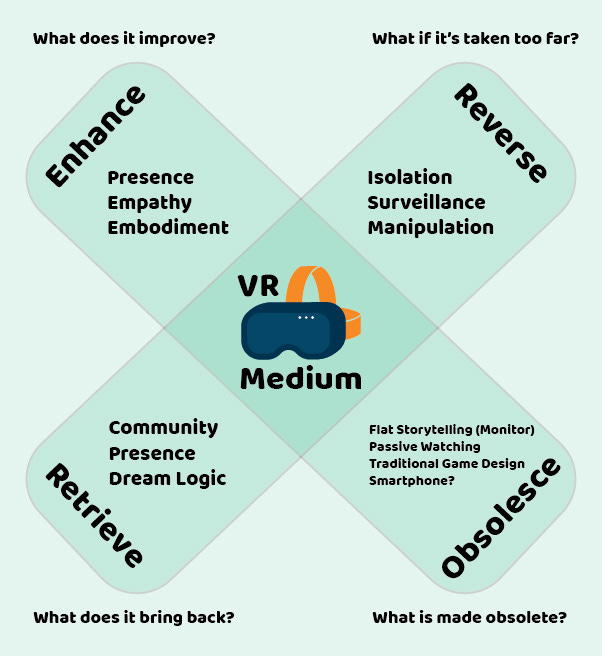Earlier this week I posted a video about VR as a medium, thinking more about how it shapes us rather than the content it delivers. Being such an interesting topic to me, I thought it’d be fun to write about too. It continues to provide new insights. 😊💡
I was inspired by media theorist Marshall McLuhan’s famous phrase “the medium is the message.” His book Understanding Media: The Extensions of Man was required reading when I was working towards my BA in Communication Studies. It’s a classic media studies book and contains many great concepts. I’ll touch on a couple here.
McLuhan argued that every new technology extends part of ourselves. For example, a fork extends the hand, a wheel extends the foot, and a mirror extends the eye. What about VR? It enhances our entire experience of reality by extending the senses, the whole self.
VR feels like a mirror, but is it distorting something? Or revealing something I wasn’t ready to see? What is it reflecting back at me?
Last month someone who played Shadow Mend sent me a video. He was at a basement bar near home and mentioned how it reminded him of the virtual club I made. That hit me. Because I didn’t create that exact space in my game. I didn’t even know it existed. But he saw it. He felt it. It’s like the medium reached into his life, not with realism, but with resonance. He filled in the gaps. But something I created in VR mirrored something in his real life.
That moment made me stop and think, What is VR doing to us when we create with it?

What does "The medium is the message" mean for VR?
McLuhan’s idea suggests that media shapes how we perceive the world, not just how it delivers content. The form itself changes us. Another way to say this is that the medium is what happens to you and that is the message. A lot of people focus on the narrative, but maybe it’s the vehicle in which it’s delivered that affects us in a certain way. Social media, for example, could then be considered bad regardless of how good the information is. It’s the nature of the phone that is the issue.
With this in mind, should we consider and try to anticipate unintended consequences of technologies like VR before they become irreversible?
Perhaps a good place to start is by applying McLuhan’s Tetrad of Media Effects to VR. The four effects are Enhance, Obsolesce, Retrieve, Reverse. He believed every new medium reveals something new, hides something old, retrieves something forgotten. And if pushed too far, reverses into its opposite.
Here’s the chart I made for this. It's my personal take so feel free to critique!
What does VR enhance?
Presence and embodiment are commonly mentioned, as is empathy, though I think that could be debated. Intimacy with space and with one’s self is enhanced, making practices like somatic body work and meditation effective in a new way. What I love about creating in VR is how it can place you inside a story, not just tell one to you. I speak to this so much that I’m keeping this one short.
What does VR make obsolete?
This is a harder one because the medium is still new enough that I don’t think it’s made anything obsolete yet. When Zuckerberg was riding the metaverse hype wagon a few years ago, he seemed to suggest that headsets might replace the smartphone, but it never caught on. His influence may have done more harm than good to VR, at least in terms of public adoption.
If I had to guess what VR could make obsolete, it might be flat storytelling (film and video on screens) and the passive consumption that comes with it. While some VR experiences are still passive, just being in a 3D space activates so many senses. Interpreting all of that feels interactive, because you're no longer separated by a screen. You don’t just watch a story unfold, you embody it.
Being immersed like this disrupts traditional game design. In VR, the camera isn’t a window. It’s your body now, and that changes everything. You don’t want to take control of the camera since it’s the player’s head, which is why cutscenes often feel more disconnected when you’re inside the world. 2D UI doesn’t translate well either; cluttered HUDs and floating menus feel awkward. We still see a lot of this in VR because it’s what we know. But over time, I think standards will emerge—ones shaped by how we naturally move through space, not by our old habits from screens.
What does VR retrieve?
McLuhan wrote about how new media often retrieve old forms as well as memory, storytelling and myth which are ancient human technologies. VR is a way to bring those back in a modern, deeply intimate form.
Community is a very ancient human activity that could be retrieved. Gathering in groups to tell and experience stories together. Good examples might be theater and ritual where socializing is not through fast, shallow social media, but through shared spaces and meaningful interaction. For this you must be present, so presence again can be seen in this category too.
Dream logic might be a stretch but could also be brought to us in a new way. VR blurs the boundaries between reality and imagination, just like dreams do. You're awake, but you're in a place where physics, time, and logic can shift. Spaces that don't have to explain themselves fully and are felt more than rationalized, surreal, like those eerie liminal spaces that are felt through an artistic lens.
What does VR reverse into if taken too far?
If the “mirror” gets too real, it stops being a reflection and starts becoming a trap. The negative side effects could be isolation, surveillance, and manipulation. There’s a lot to discuss here, but I’m keeping this one short too. I’ll return to distortions later so we can shift focus to McLuhan’s concept of hot and cold media. Understanding that might help us answer some of the questions raised by these four effects.

Mainly this chart is describing how much you must engage your imagination to complete the experience with a particular medium. Hot is high definition like film, which provides a lot of information and requires less participation. Cold is low definition like a comic book or telephone, giving less detail so you need to participate more to make sense of it by filling in the gaps.
Maybe VR is a cool medium pretending to be hot. VR floods the senses by surrounding us with sound, space, movement. It feels like a hot medium, like it’s doing everything for you. Although your body is immersed, there’s no real touch, no real face in front of you. Your mind works overtime to complete the illusion, just like it does in dreams or memory.
And maybe that’s why it feels so personal. It’s not just stimulating, but also participatory. It invites interpretation and even introspection.
When creating with this medium, it can be harder to make a single design translate across platforms or devices. And if the promise of the metaverse is interoperability, that presents a challenge. It’s not as big a leap as adapting a book to film, but parts of the experience can still be perceived differently or even lost depending on the device.
I discovered this when creating Mermaid Song for VIVERSE. VR was my main focus and once I got to testing on the phone, the main sound interaction was lost on iPhone due to a tech issue that I had no time to solve (and think it was possibly platform-based or an Apple limitation). It's like the old challenge of making sure your website looks good on all browsers, but worse. Even if the design is flawless for all the different platforms, I think the medium completely changes the way the content is experienced due to the level of immersion.
Is VR a mirror?
When people first get into VR design and development, I see a lot of them wanting things to look realistic, like a replica of a familiar physical location. I did this too, by attempting to resurrect Neo in Shadow Mend. But the medium can take us to new worlds, so why do we instinctively want to recreate our physical world in the digital one? Is it because it reflects what we hope and fear, or how we see ourselves and others? Maybe it comes down to a sense of relatedness, like how someone was able to see his real-life bar in my MEOW club.
A comment I received on my YouTube video seems to begin answering this by stating, “It's something about 'simulation' and 'self-concept'... reconstructing personal stories... intersubjectivity.”
It makes me think of the Razorfish study titled “The Metaverse: What Gaming Today Teaches Us About the Metaverse Tomorrow,” which is a few years old now, so I wonder how much of it is still true. The study found that many Gen Z gamers see the metaverse as an extension of real life.
“In fact, 57% of Gen Z gamers feel they’re able to self-express more openly to others in a game than they do in real life.” - Razorfish and VICE Media Group
But we must be careful it doesn’t become a distortion.
VR as a medium could potentially distort perception and memory. I can imagine people saying things like, “I don’t remember it happening that way!” It could idealize a certain reality or create a disillusioned one by presenting worlds we can’t or won’t achieve in real life. Isolation could become even more intense than it has been with social media if some people choose to stay in VR headsets and are too scared to venture out into the real world. I also wonder if it could re-traumatize someone, or cheapen trauma, since we’ll never truly know how a situation felt for someone else. This is why I think exposure therapy and experiences meant to put a person in someone else’s shoes need to be carefully done.
How can we become media-aware artists by using the medium itself to speak to its hidden message? A message about being present in our bodies and aware of our environments, both digital and physical. VR doesn’t just let us escape. It also lets us confront. It’s a mirror. Are we ready to look and see what’s already there?
That email meant a lot to me. Because it wasn’t just someone enjoying my VR story. It was that he saw his life reflected back at him through it. It didn’t just represent a space. It resonated with his lived experience.
And maybe it’s no accident Shadow Mend deals so much with memory. Maybe that was my intuition all along. VR isn’t just about leaving our physical reality behind. It’s about remembering and seeing the world in our own unique way. My hope for connection, for finding common ground, feels possible. It’s the reason I create art.
And that makes me happy.



